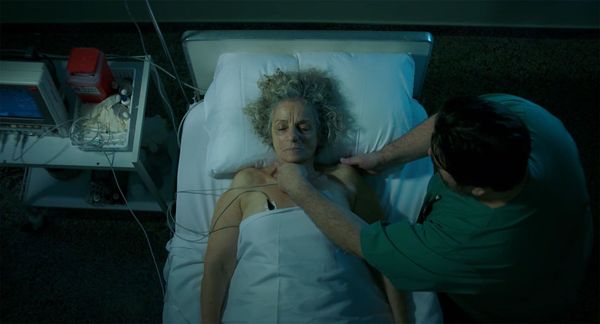Eye For Film >> Movies >> La Dosis (2020) Film Review
La Dosis
Reviewed by: Jennie Kermode

Marcos (Carlos Portaluppi) is a hardworking, long serving nurse on a palliative care ward, eking out his life supporting people who have little hope of recovering theirs. He's patient and diligent about his work and follows his own code of ethics. Every now and again, when he considers a patient to be beyond hope, he discreetly administers an overdose to speed them on their way. It's a simple life until, one day, newcomer Gabriel (Ignacio Rogers) takes a job on the ward and throws everything into chaos.
Gabriel is practically the polar opposite of Marcos. Young, slim, brimming over with confidence, he soon establishes himself as a favourite and may even pip Marcos to promotion. But something feels wrong. This is supposedly his first nursing job, so why does he seem so familiar with all the tasks involved? Why does he keep volunteering to do extra work? Before long, Marcos discovers that Gabriel, too, is killing patients - but rather than doing it in an attempt to be merciful, he's doing it because he enjoys it.
There's enough of a hook here for a solid thriller, but director Martin Kraut doesn't settle for a simple blackmail plot. He takes his tale of moral compromise one step further, using it to question whether Marcos' motives are really what he thinks they are. As the relationship between the two men develops, the older nurse is forced to question himself in multiple ways. His clear resentment and jealousy of Gabriel increasingly seems bound up with sexual attraction, but that's the last thing he wants to feel. Gabriel, who has already gone to some lengths to befriend him - perhaps intrigued by this solitary holdout against his charm offensive, perhaps genuinely convinced that they're kindred spirits - seems to sense this, and flirts back, making Marcos still more uncomfortable.
A good deal of the film is spent developing this scenario, perhaps reflecting the slow pace of life on the ward, and Kraut doesn't have quite enough ideas to fill the time with. Portaluppi makes a great lead, fully invested in his character and easy to relate to no matter one's opinion of his choices, but this long, slow stretch is tougher for Rogers, who - perhaps intentionally - doesn't get the same depth of character to explore. Later in the film there are moments of black comedy as Marcus attempts to confess what he has done and no-one seems to listen. A little of this works nicely, adding to the film's bit, but it's overdone and ends up diluting the atmosphere that Kraut has carefully built up.
In between is more conventional thriller territory - it's not as interesting in and of itself, but Kraut handles it well, with good pacing an a confident grasp of character dynamics. Against the odds, this is where the film shines. It was a curious choice for Fantasia 2020, which may have skewed the way viewers interpreted it. Where it succeeds in generating feelings of horror, that's not so much a consequence of its interest in serial killing.
Gustavo Biazzi's cinematography immerses the viewer in a landscape of hospital blues and greens, as uniform in Argentina as they are in the UK. It's a cold, lonely world where beeping monitors count down the seconds of fading lives. Nurses offer comfort where they can but are constantly busy. Death seems like a minor element in a much larger tragedy, with culpability extending far beyond the film's central protagonists.
Reviewed on: 02 Sep 2020
















